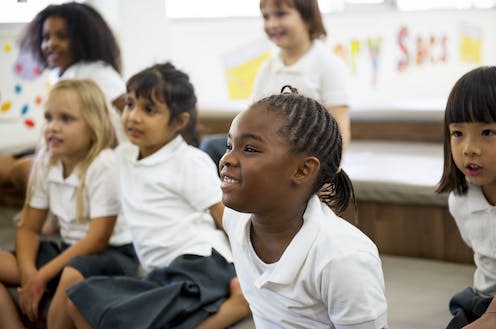The worries parents from ethnic minority backgrounds have about their children's experiences at school

Children and young people should be able to study in schools that recognise and respect their diverse backgrounds. But teachers sometimes struggle to handle this diversity in the classroom.
Findings from research conducted in Ireland have shown that teachers may not receive adequate training in intercultural education.
My research investigated how parents from minority ethnic (non-white) backgrounds who had immigrated to Ireland felt about their children’s school education.
I carried out five group discussions with 20 parents from minority-ethnic backgrounds in Ireland in early 2020. I wanted to understand the parents’ experiences with schooling in Ireland and other countries, their opinions on teaching and learning in Irish schools, their relationships with teachers and schools, and their advice for creating culturally inclusive learning environments.
Uncertainty and unfamiliarity
I found that some parents may feel fear and uncertainty when their children attend school, as they may not be familiar with the customs and practices of the education system of the country they have moved to. They had worries about the way their childrens’ race affected their school experiences: one parent said they thought teachers were unfairly singling their children out because of their colour.
The parents also had concerns about the cultural knowledge of the staff at their children’s schools, and how this might affect their education. One said:
Teachers […] need to learn how to deal with kids of different backgrounds. […] I suppose they need to further learn all the different cultures.
The parents suggested that schools needed to take specific action to learn about the cultures and backgrounds of the children they taught:
Any school with people from diverse cultures should try to organise meetings where they invite parents, particularly those from migrant backgrounds, to discuss with the parents, the difficulties they as teachers are having with their work.
Research has found that parental engagement with school promotes good behaviour by children. But how an immigrant parent interacts with their child’s school may be affected by factors such as a language barrier and lack of familiarity with the school system.
Teaching about cultures
The parents also emphasised the importance of school and teachers to convey understanding of other cultures to pupils.
Just the other day […] my daughter was playing on the yard with other children, but because they don’t understand her hair, she got her natural hair, they told her she needs to go to a hairdresser, they think something is wrong with her hair. They don’t understand. You can’t blame them because, in school, that’s what they learn. And it should be incorporated into the curriculum that we are different. Our hair is different. The teacher has to understand that.

They spoke about the potential benefits of increasing diversity among teachers and other school staff. This can create a more inclusive and welcoming environment for minority ethnic students, providing them with role models who they can relate to and who understand their cultural backgrounds.
Who is teaching them is white, who is taking them on break is white, who is giving them canteen food is white […] So we should ensure that these young guys [from minority ethnic backgrounds] who are attending universities should choose the teaching profession as a priority […] For me, the solution is to diversify the teaching profession and have representations from different culture.
Inclusive education, which puts childrens’ diverse needs at the heart of the curriculum rather than in particular, separate classes or programmes, is not always implemented. School leaders and teachers may lack the competency to put inclusive education into practice.
It is essential that schools take an approach that considers how a student’s culture affects their learning. This is known as culturally responsive pedagogy. It is a teaching approach that aims to create classrooms where all students feel included and valued by teachers who incorporate their cultural backgrounds and experiences.
This article is republished from The Conversation under a Creative Commons license. Read the original article.

Seun Bunmi Adebayo receives funding from Irish Research Council.

 Yahoo News
Yahoo News 
